Gastronomy Tourism Analysis: A Comparative Study of Three Nations
VerifiedAdded on 2023/01/05
|10
|3430
|55
Essay
AI Summary
This essay delves into the concept of gastronomy tourism, defining it as tourism driven by the exploration of food and beverages, which are integral to a nation's culture. It highlights the evolution of the term and its association with experiencing local cultural themes through cuisine. The essay then critically examines gastronomy tourism, showcasing examples from Hong Kong, Singapore, and Thailand. In Hong Kong, it emphasizes the role of diverse food cultures, particularly dim sum, in attracting tourists and promoting the city as a food paradise. In Singapore, it discusses the nation's slogan "The Food Capital of Asia" and the importance of its diverse cuisine in drawing visitors, with examples of annual food festivals and dining themes. Finally, it explores Thailand's gastronomic profile, highlighting the influence of various culinary traditions, such as Thai cuisine and the abundance of natural resources, ethnicity and tribe, culture and tradition, and other sorts of unique attributes that make the country stand out. The essay concludes by summarizing the significance of gastronomy tourism as a key driver of cultural and economic development in these three nations.
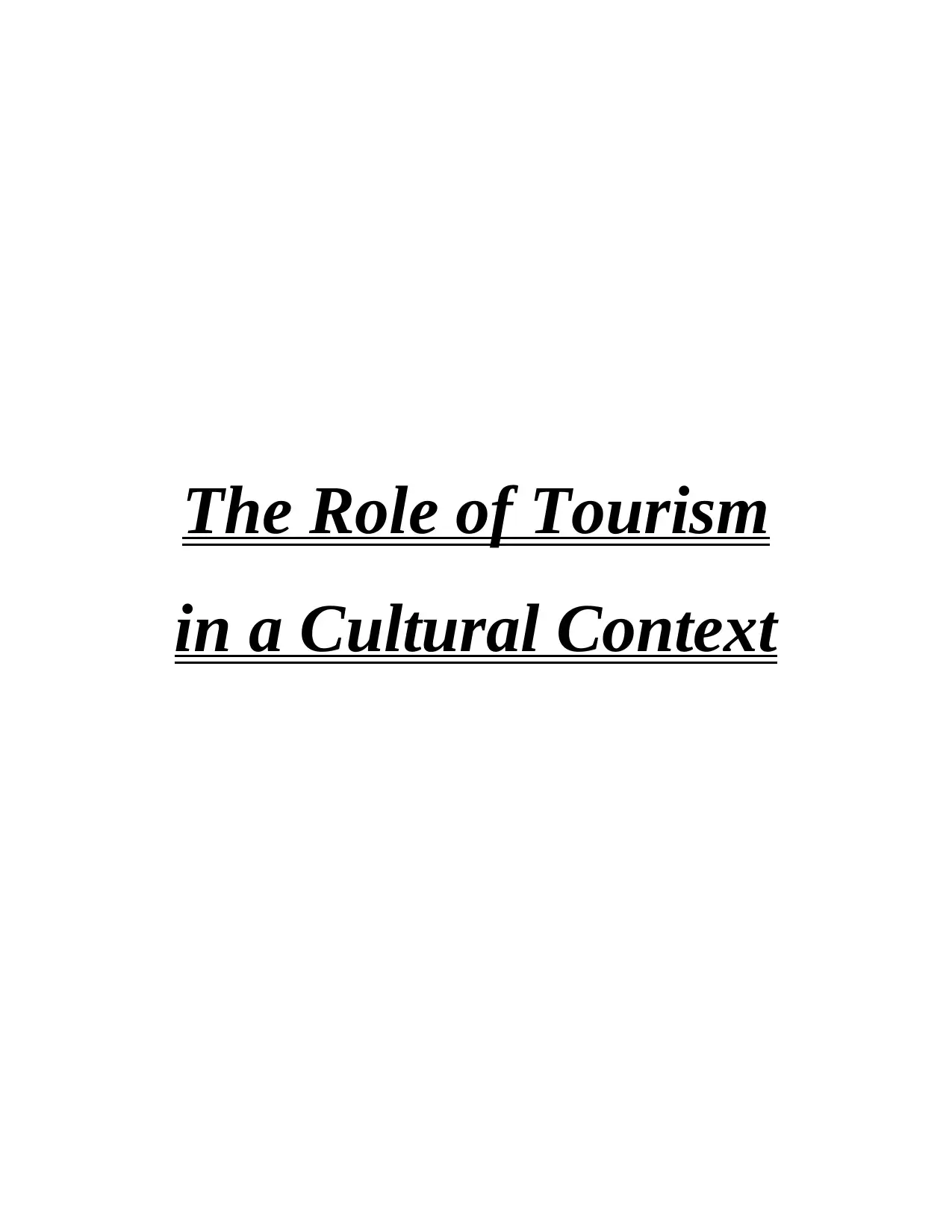
The Role of Tourism
in a Cultural Context
in a Cultural Context
Paraphrase This Document
Need a fresh take? Get an instant paraphrase of this document with our AI Paraphraser
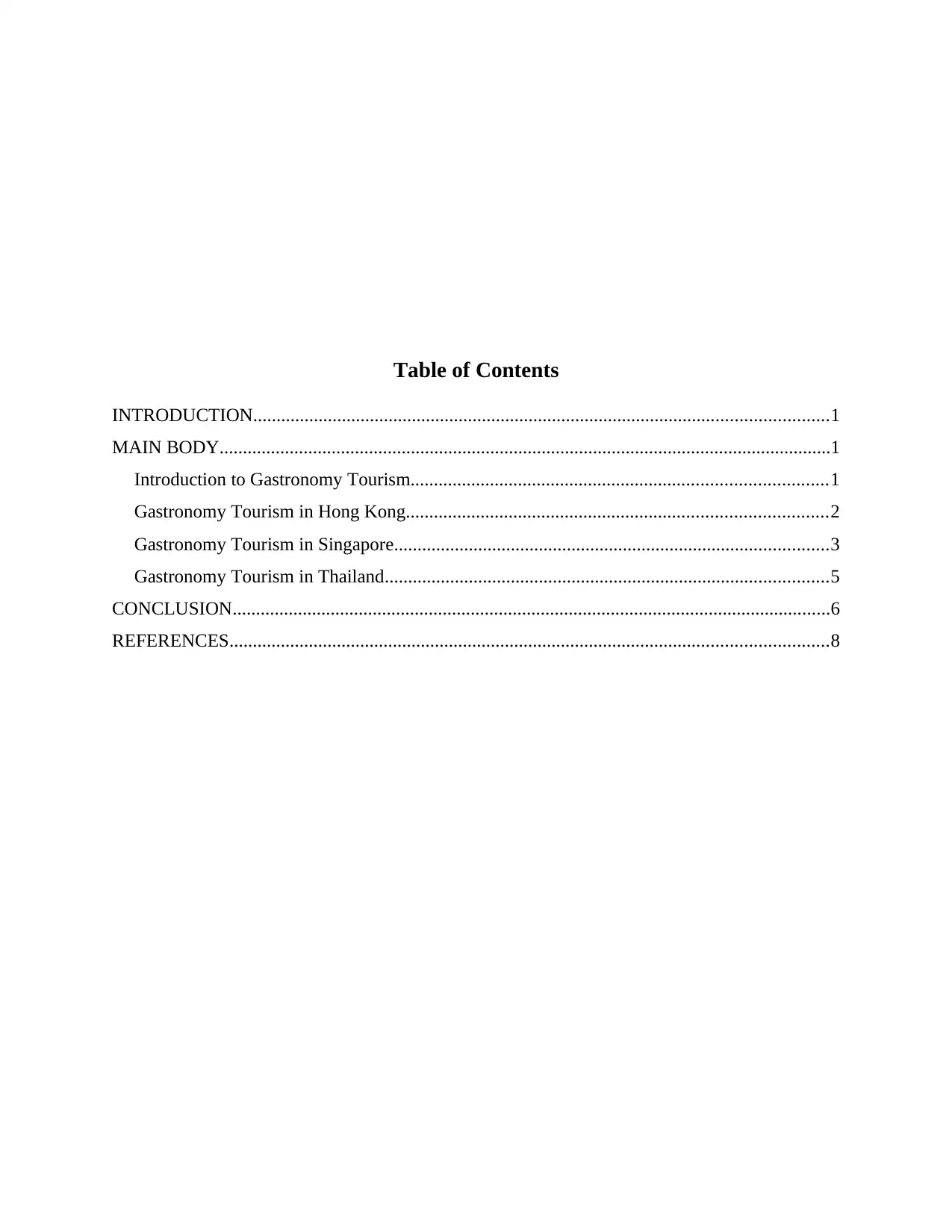
Table of Contents
INTRODUCTION...........................................................................................................................1
MAIN BODY...................................................................................................................................1
Introduction to Gastronomy Tourism.........................................................................................1
Gastronomy Tourism in Hong Kong..........................................................................................2
Gastronomy Tourism in Singapore.............................................................................................3
Gastronomy Tourism in Thailand...............................................................................................5
CONCLUSION................................................................................................................................6
REFERENCES................................................................................................................................8
INTRODUCTION...........................................................................................................................1
MAIN BODY...................................................................................................................................1
Introduction to Gastronomy Tourism.........................................................................................1
Gastronomy Tourism in Hong Kong..........................................................................................2
Gastronomy Tourism in Singapore.............................................................................................3
Gastronomy Tourism in Thailand...............................................................................................5
CONCLUSION................................................................................................................................6
REFERENCES................................................................................................................................8
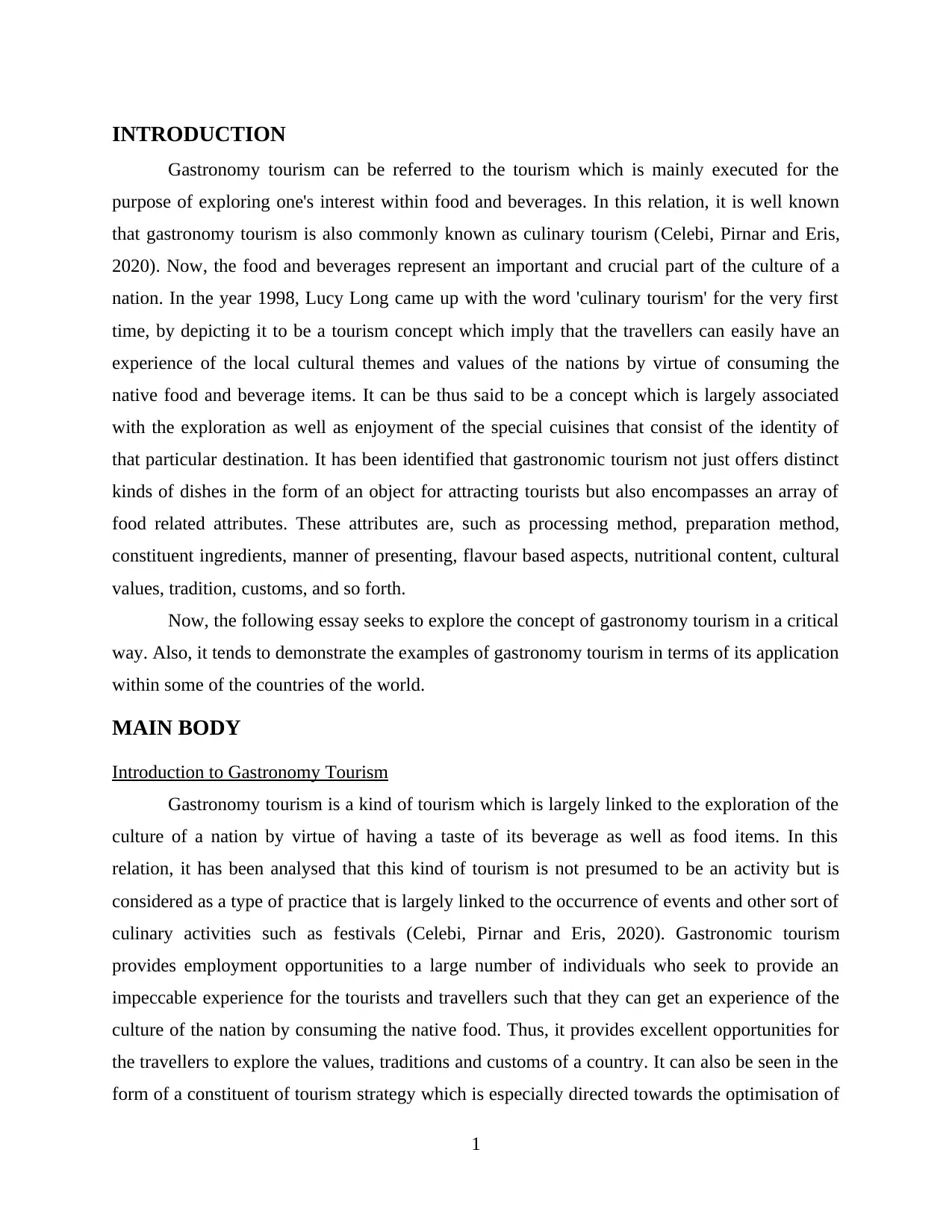
INTRODUCTION
Gastronomy tourism can be referred to the tourism which is mainly executed for the
purpose of exploring one's interest within food and beverages. In this relation, it is well known
that gastronomy tourism is also commonly known as culinary tourism (Celebi, Pirnar and Eris,
2020). Now, the food and beverages represent an important and crucial part of the culture of a
nation. In the year 1998, Lucy Long came up with the word 'culinary tourism' for the very first
time, by depicting it to be a tourism concept which imply that the travellers can easily have an
experience of the local cultural themes and values of the nations by virtue of consuming the
native food and beverage items. It can be thus said to be a concept which is largely associated
with the exploration as well as enjoyment of the special cuisines that consist of the identity of
that particular destination. It has been identified that gastronomic tourism not just offers distinct
kinds of dishes in the form of an object for attracting tourists but also encompasses an array of
food related attributes. These attributes are, such as processing method, preparation method,
constituent ingredients, manner of presenting, flavour based aspects, nutritional content, cultural
values, tradition, customs, and so forth.
Now, the following essay seeks to explore the concept of gastronomy tourism in a critical
way. Also, it tends to demonstrate the examples of gastronomy tourism in terms of its application
within some of the countries of the world.
MAIN BODY
Introduction to Gastronomy Tourism
Gastronomy tourism is a kind of tourism which is largely linked to the exploration of the
culture of a nation by virtue of having a taste of its beverage as well as food items. In this
relation, it has been analysed that this kind of tourism is not presumed to be an activity but is
considered as a type of practice that is largely linked to the occurrence of events and other sort of
culinary activities such as festivals (Celebi, Pirnar and Eris, 2020). Gastronomic tourism
provides employment opportunities to a large number of individuals who seek to provide an
impeccable experience for the tourists and travellers such that they can get an experience of the
culture of the nation by consuming the native food. Thus, it provides excellent opportunities for
the travellers to explore the values, traditions and customs of a country. It can also be seen in the
form of a constituent of tourism strategy which is especially directed towards the optimisation of
1
Gastronomy tourism can be referred to the tourism which is mainly executed for the
purpose of exploring one's interest within food and beverages. In this relation, it is well known
that gastronomy tourism is also commonly known as culinary tourism (Celebi, Pirnar and Eris,
2020). Now, the food and beverages represent an important and crucial part of the culture of a
nation. In the year 1998, Lucy Long came up with the word 'culinary tourism' for the very first
time, by depicting it to be a tourism concept which imply that the travellers can easily have an
experience of the local cultural themes and values of the nations by virtue of consuming the
native food and beverage items. It can be thus said to be a concept which is largely associated
with the exploration as well as enjoyment of the special cuisines that consist of the identity of
that particular destination. It has been identified that gastronomic tourism not just offers distinct
kinds of dishes in the form of an object for attracting tourists but also encompasses an array of
food related attributes. These attributes are, such as processing method, preparation method,
constituent ingredients, manner of presenting, flavour based aspects, nutritional content, cultural
values, tradition, customs, and so forth.
Now, the following essay seeks to explore the concept of gastronomy tourism in a critical
way. Also, it tends to demonstrate the examples of gastronomy tourism in terms of its application
within some of the countries of the world.
MAIN BODY
Introduction to Gastronomy Tourism
Gastronomy tourism is a kind of tourism which is largely linked to the exploration of the
culture of a nation by virtue of having a taste of its beverage as well as food items. In this
relation, it has been analysed that this kind of tourism is not presumed to be an activity but is
considered as a type of practice that is largely linked to the occurrence of events and other sort of
culinary activities such as festivals (Celebi, Pirnar and Eris, 2020). Gastronomic tourism
provides employment opportunities to a large number of individuals who seek to provide an
impeccable experience for the tourists and travellers such that they can get an experience of the
culture of the nation by consuming the native food. Thus, it provides excellent opportunities for
the travellers to explore the values, traditions and customs of a country. It can also be seen in the
form of a constituent of tourism strategy which is especially directed towards the optimisation of
1
⊘ This is a preview!⊘
Do you want full access?
Subscribe today to unlock all pages.

Trusted by 1+ million students worldwide
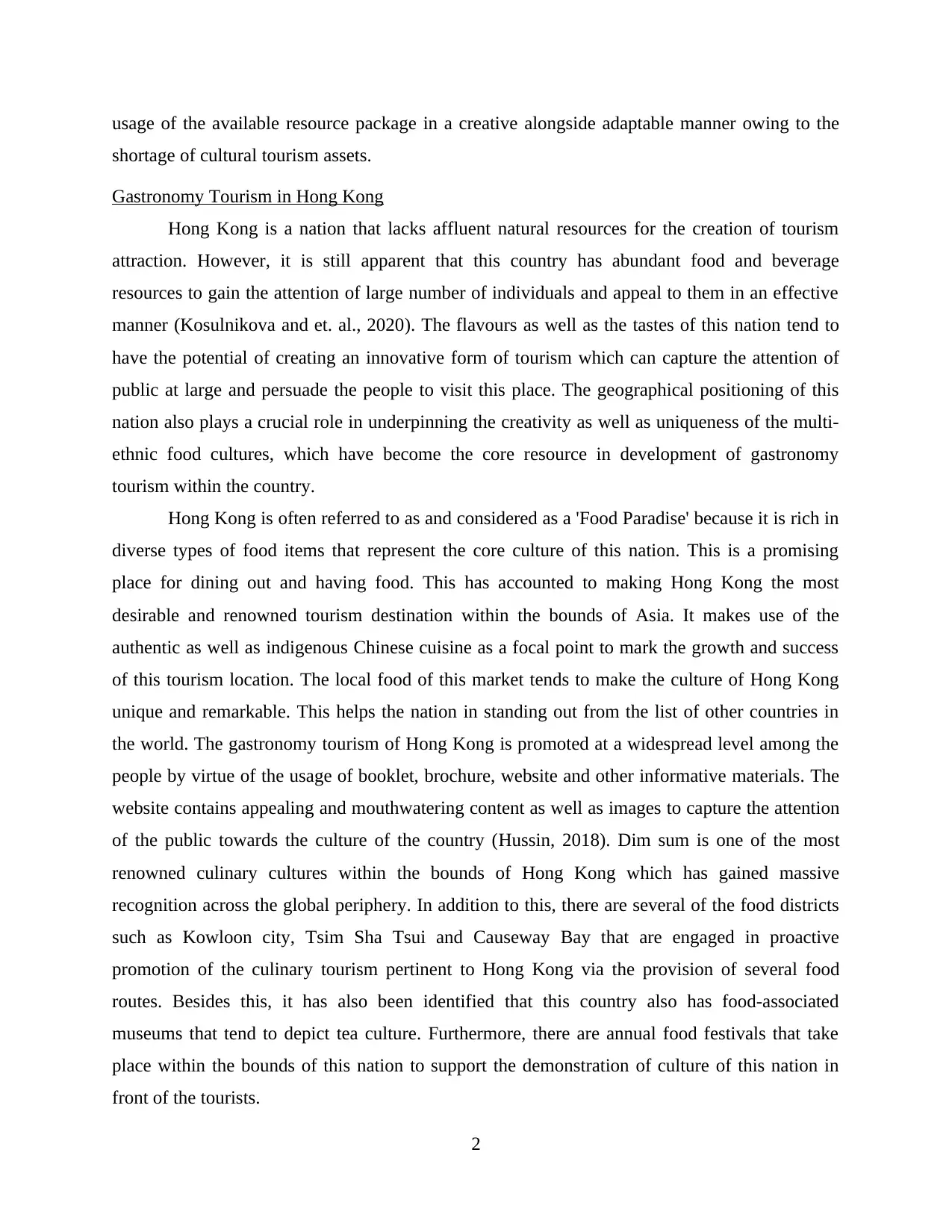
usage of the available resource package in a creative alongside adaptable manner owing to the
shortage of cultural tourism assets.
Gastronomy Tourism in Hong Kong
Hong Kong is a nation that lacks affluent natural resources for the creation of tourism
attraction. However, it is still apparent that this country has abundant food and beverage
resources to gain the attention of large number of individuals and appeal to them in an effective
manner (Kosulnikova and et. al., 2020). The flavours as well as the tastes of this nation tend to
have the potential of creating an innovative form of tourism which can capture the attention of
public at large and persuade the people to visit this place. The geographical positioning of this
nation also plays a crucial role in underpinning the creativity as well as uniqueness of the multi-
ethnic food cultures, which have become the core resource in development of gastronomy
tourism within the country.
Hong Kong is often referred to as and considered as a 'Food Paradise' because it is rich in
diverse types of food items that represent the core culture of this nation. This is a promising
place for dining out and having food. This has accounted to making Hong Kong the most
desirable and renowned tourism destination within the bounds of Asia. It makes use of the
authentic as well as indigenous Chinese cuisine as a focal point to mark the growth and success
of this tourism location. The local food of this market tends to make the culture of Hong Kong
unique and remarkable. This helps the nation in standing out from the list of other countries in
the world. The gastronomy tourism of Hong Kong is promoted at a widespread level among the
people by virtue of the usage of booklet, brochure, website and other informative materials. The
website contains appealing and mouthwatering content as well as images to capture the attention
of the public towards the culture of the country (Hussin, 2018). Dim sum is one of the most
renowned culinary cultures within the bounds of Hong Kong which has gained massive
recognition across the global periphery. In addition to this, there are several of the food districts
such as Kowloon city, Tsim Sha Tsui and Causeway Bay that are engaged in proactive
promotion of the culinary tourism pertinent to Hong Kong via the provision of several food
routes. Besides this, it has also been identified that this country also has food-associated
museums that tend to depict tea culture. Furthermore, there are annual food festivals that take
place within the bounds of this nation to support the demonstration of culture of this nation in
front of the tourists.
2
shortage of cultural tourism assets.
Gastronomy Tourism in Hong Kong
Hong Kong is a nation that lacks affluent natural resources for the creation of tourism
attraction. However, it is still apparent that this country has abundant food and beverage
resources to gain the attention of large number of individuals and appeal to them in an effective
manner (Kosulnikova and et. al., 2020). The flavours as well as the tastes of this nation tend to
have the potential of creating an innovative form of tourism which can capture the attention of
public at large and persuade the people to visit this place. The geographical positioning of this
nation also plays a crucial role in underpinning the creativity as well as uniqueness of the multi-
ethnic food cultures, which have become the core resource in development of gastronomy
tourism within the country.
Hong Kong is often referred to as and considered as a 'Food Paradise' because it is rich in
diverse types of food items that represent the core culture of this nation. This is a promising
place for dining out and having food. This has accounted to making Hong Kong the most
desirable and renowned tourism destination within the bounds of Asia. It makes use of the
authentic as well as indigenous Chinese cuisine as a focal point to mark the growth and success
of this tourism location. The local food of this market tends to make the culture of Hong Kong
unique and remarkable. This helps the nation in standing out from the list of other countries in
the world. The gastronomy tourism of Hong Kong is promoted at a widespread level among the
people by virtue of the usage of booklet, brochure, website and other informative materials. The
website contains appealing and mouthwatering content as well as images to capture the attention
of the public towards the culture of the country (Hussin, 2018). Dim sum is one of the most
renowned culinary cultures within the bounds of Hong Kong which has gained massive
recognition across the global periphery. In addition to this, there are several of the food districts
such as Kowloon city, Tsim Sha Tsui and Causeway Bay that are engaged in proactive
promotion of the culinary tourism pertinent to Hong Kong via the provision of several food
routes. Besides this, it has also been identified that this country also has food-associated
museums that tend to depict tea culture. Furthermore, there are annual food festivals that take
place within the bounds of this nation to support the demonstration of culture of this nation in
front of the tourists.
2
Paraphrase This Document
Need a fresh take? Get an instant paraphrase of this document with our AI Paraphraser
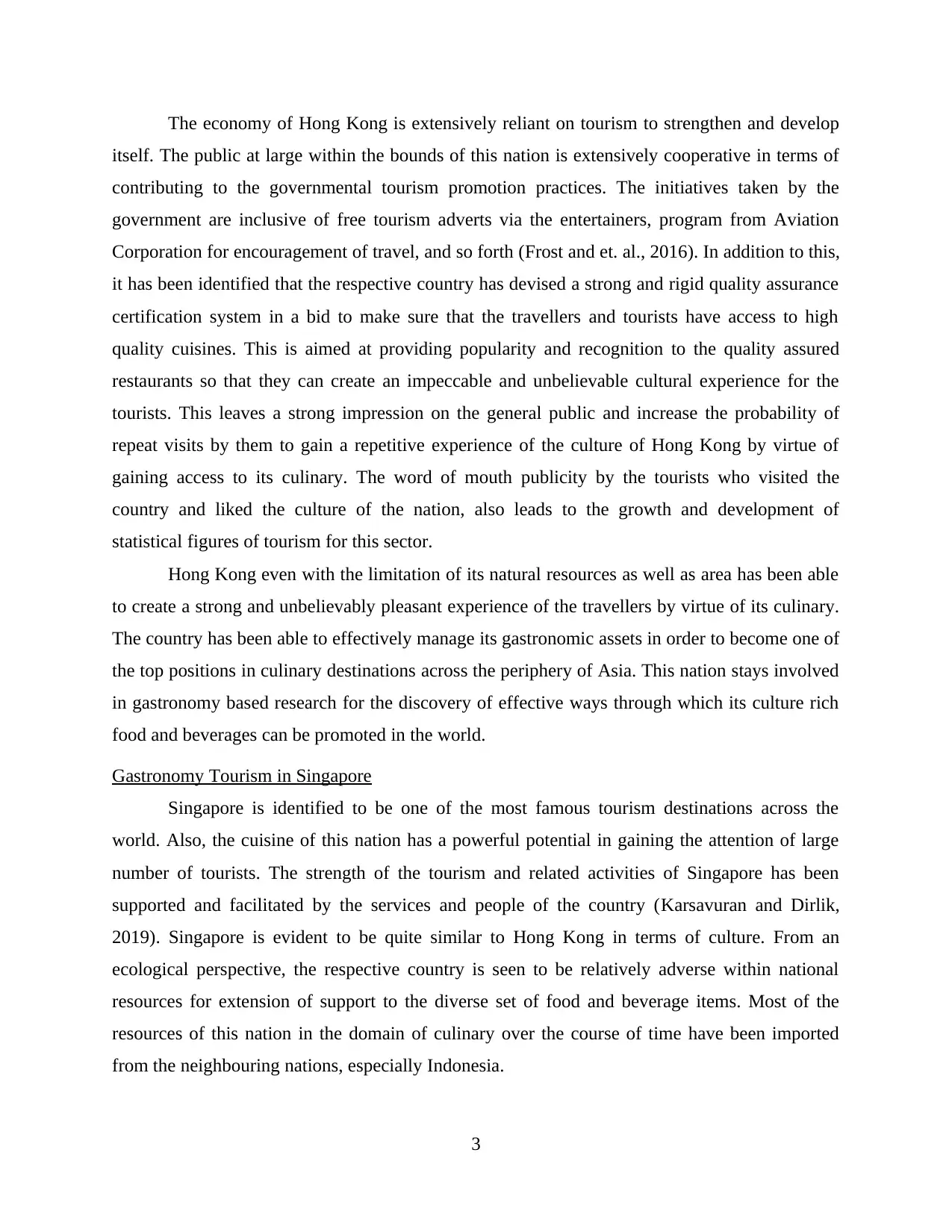
The economy of Hong Kong is extensively reliant on tourism to strengthen and develop
itself. The public at large within the bounds of this nation is extensively cooperative in terms of
contributing to the governmental tourism promotion practices. The initiatives taken by the
government are inclusive of free tourism adverts via the entertainers, program from Aviation
Corporation for encouragement of travel, and so forth (Frost and et. al., 2016). In addition to this,
it has been identified that the respective country has devised a strong and rigid quality assurance
certification system in a bid to make sure that the travellers and tourists have access to high
quality cuisines. This is aimed at providing popularity and recognition to the quality assured
restaurants so that they can create an impeccable and unbelievable cultural experience for the
tourists. This leaves a strong impression on the general public and increase the probability of
repeat visits by them to gain a repetitive experience of the culture of Hong Kong by virtue of
gaining access to its culinary. The word of mouth publicity by the tourists who visited the
country and liked the culture of the nation, also leads to the growth and development of
statistical figures of tourism for this sector.
Hong Kong even with the limitation of its natural resources as well as area has been able
to create a strong and unbelievably pleasant experience of the travellers by virtue of its culinary.
The country has been able to effectively manage its gastronomic assets in order to become one of
the top positions in culinary destinations across the periphery of Asia. This nation stays involved
in gastronomy based research for the discovery of effective ways through which its culture rich
food and beverages can be promoted in the world.
Gastronomy Tourism in Singapore
Singapore is identified to be one of the most famous tourism destinations across the
world. Also, the cuisine of this nation has a powerful potential in gaining the attention of large
number of tourists. The strength of the tourism and related activities of Singapore has been
supported and facilitated by the services and people of the country (Karsavuran and Dirlik,
2019). Singapore is evident to be quite similar to Hong Kong in terms of culture. From an
ecological perspective, the respective country is seen to be relatively adverse within national
resources for extension of support to the diverse set of food and beverage items. Most of the
resources of this nation in the domain of culinary over the course of time have been imported
from the neighbouring nations, especially Indonesia.
3
itself. The public at large within the bounds of this nation is extensively cooperative in terms of
contributing to the governmental tourism promotion practices. The initiatives taken by the
government are inclusive of free tourism adverts via the entertainers, program from Aviation
Corporation for encouragement of travel, and so forth (Frost and et. al., 2016). In addition to this,
it has been identified that the respective country has devised a strong and rigid quality assurance
certification system in a bid to make sure that the travellers and tourists have access to high
quality cuisines. This is aimed at providing popularity and recognition to the quality assured
restaurants so that they can create an impeccable and unbelievable cultural experience for the
tourists. This leaves a strong impression on the general public and increase the probability of
repeat visits by them to gain a repetitive experience of the culture of Hong Kong by virtue of
gaining access to its culinary. The word of mouth publicity by the tourists who visited the
country and liked the culture of the nation, also leads to the growth and development of
statistical figures of tourism for this sector.
Hong Kong even with the limitation of its natural resources as well as area has been able
to create a strong and unbelievably pleasant experience of the travellers by virtue of its culinary.
The country has been able to effectively manage its gastronomic assets in order to become one of
the top positions in culinary destinations across the periphery of Asia. This nation stays involved
in gastronomy based research for the discovery of effective ways through which its culture rich
food and beverages can be promoted in the world.
Gastronomy Tourism in Singapore
Singapore is identified to be one of the most famous tourism destinations across the
world. Also, the cuisine of this nation has a powerful potential in gaining the attention of large
number of tourists. The strength of the tourism and related activities of Singapore has been
supported and facilitated by the services and people of the country (Karsavuran and Dirlik,
2019). Singapore is evident to be quite similar to Hong Kong in terms of culture. From an
ecological perspective, the respective country is seen to be relatively adverse within national
resources for extension of support to the diverse set of food and beverage items. Most of the
resources of this nation in the domain of culinary over the course of time have been imported
from the neighbouring nations, especially Indonesia.
3
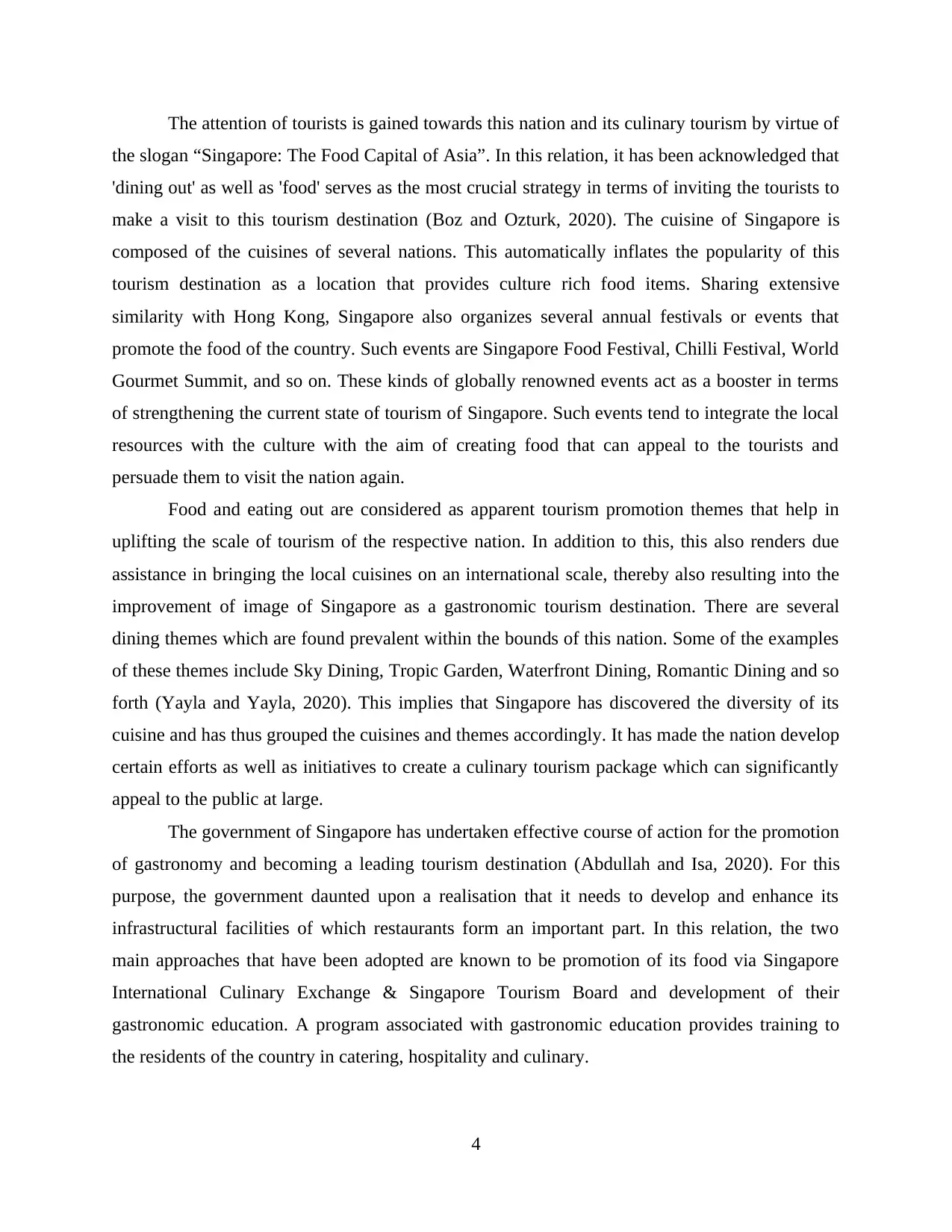
The attention of tourists is gained towards this nation and its culinary tourism by virtue of
the slogan “Singapore: The Food Capital of Asia”. In this relation, it has been acknowledged that
'dining out' as well as 'food' serves as the most crucial strategy in terms of inviting the tourists to
make a visit to this tourism destination (Boz and Ozturk, 2020). The cuisine of Singapore is
composed of the cuisines of several nations. This automatically inflates the popularity of this
tourism destination as a location that provides culture rich food items. Sharing extensive
similarity with Hong Kong, Singapore also organizes several annual festivals or events that
promote the food of the country. Such events are Singapore Food Festival, Chilli Festival, World
Gourmet Summit, and so on. These kinds of globally renowned events act as a booster in terms
of strengthening the current state of tourism of Singapore. Such events tend to integrate the local
resources with the culture with the aim of creating food that can appeal to the tourists and
persuade them to visit the nation again.
Food and eating out are considered as apparent tourism promotion themes that help in
uplifting the scale of tourism of the respective nation. In addition to this, this also renders due
assistance in bringing the local cuisines on an international scale, thereby also resulting into the
improvement of image of Singapore as a gastronomic tourism destination. There are several
dining themes which are found prevalent within the bounds of this nation. Some of the examples
of these themes include Sky Dining, Tropic Garden, Waterfront Dining, Romantic Dining and so
forth (Yayla and Yayla, 2020). This implies that Singapore has discovered the diversity of its
cuisine and has thus grouped the cuisines and themes accordingly. It has made the nation develop
certain efforts as well as initiatives to create a culinary tourism package which can significantly
appeal to the public at large.
The government of Singapore has undertaken effective course of action for the promotion
of gastronomy and becoming a leading tourism destination (Abdullah and Isa, 2020). For this
purpose, the government daunted upon a realisation that it needs to develop and enhance its
infrastructural facilities of which restaurants form an important part. In this relation, the two
main approaches that have been adopted are known to be promotion of its food via Singapore
International Culinary Exchange & Singapore Tourism Board and development of their
gastronomic education. A program associated with gastronomic education provides training to
the residents of the country in catering, hospitality and culinary.
4
the slogan “Singapore: The Food Capital of Asia”. In this relation, it has been acknowledged that
'dining out' as well as 'food' serves as the most crucial strategy in terms of inviting the tourists to
make a visit to this tourism destination (Boz and Ozturk, 2020). The cuisine of Singapore is
composed of the cuisines of several nations. This automatically inflates the popularity of this
tourism destination as a location that provides culture rich food items. Sharing extensive
similarity with Hong Kong, Singapore also organizes several annual festivals or events that
promote the food of the country. Such events are Singapore Food Festival, Chilli Festival, World
Gourmet Summit, and so on. These kinds of globally renowned events act as a booster in terms
of strengthening the current state of tourism of Singapore. Such events tend to integrate the local
resources with the culture with the aim of creating food that can appeal to the tourists and
persuade them to visit the nation again.
Food and eating out are considered as apparent tourism promotion themes that help in
uplifting the scale of tourism of the respective nation. In addition to this, this also renders due
assistance in bringing the local cuisines on an international scale, thereby also resulting into the
improvement of image of Singapore as a gastronomic tourism destination. There are several
dining themes which are found prevalent within the bounds of this nation. Some of the examples
of these themes include Sky Dining, Tropic Garden, Waterfront Dining, Romantic Dining and so
forth (Yayla and Yayla, 2020). This implies that Singapore has discovered the diversity of its
cuisine and has thus grouped the cuisines and themes accordingly. It has made the nation develop
certain efforts as well as initiatives to create a culinary tourism package which can significantly
appeal to the public at large.
The government of Singapore has undertaken effective course of action for the promotion
of gastronomy and becoming a leading tourism destination (Abdullah and Isa, 2020). For this
purpose, the government daunted upon a realisation that it needs to develop and enhance its
infrastructural facilities of which restaurants form an important part. In this relation, the two
main approaches that have been adopted are known to be promotion of its food via Singapore
International Culinary Exchange & Singapore Tourism Board and development of their
gastronomic education. A program associated with gastronomic education provides training to
the residents of the country in catering, hospitality and culinary.
4
⊘ This is a preview!⊘
Do you want full access?
Subscribe today to unlock all pages.

Trusted by 1+ million students worldwide
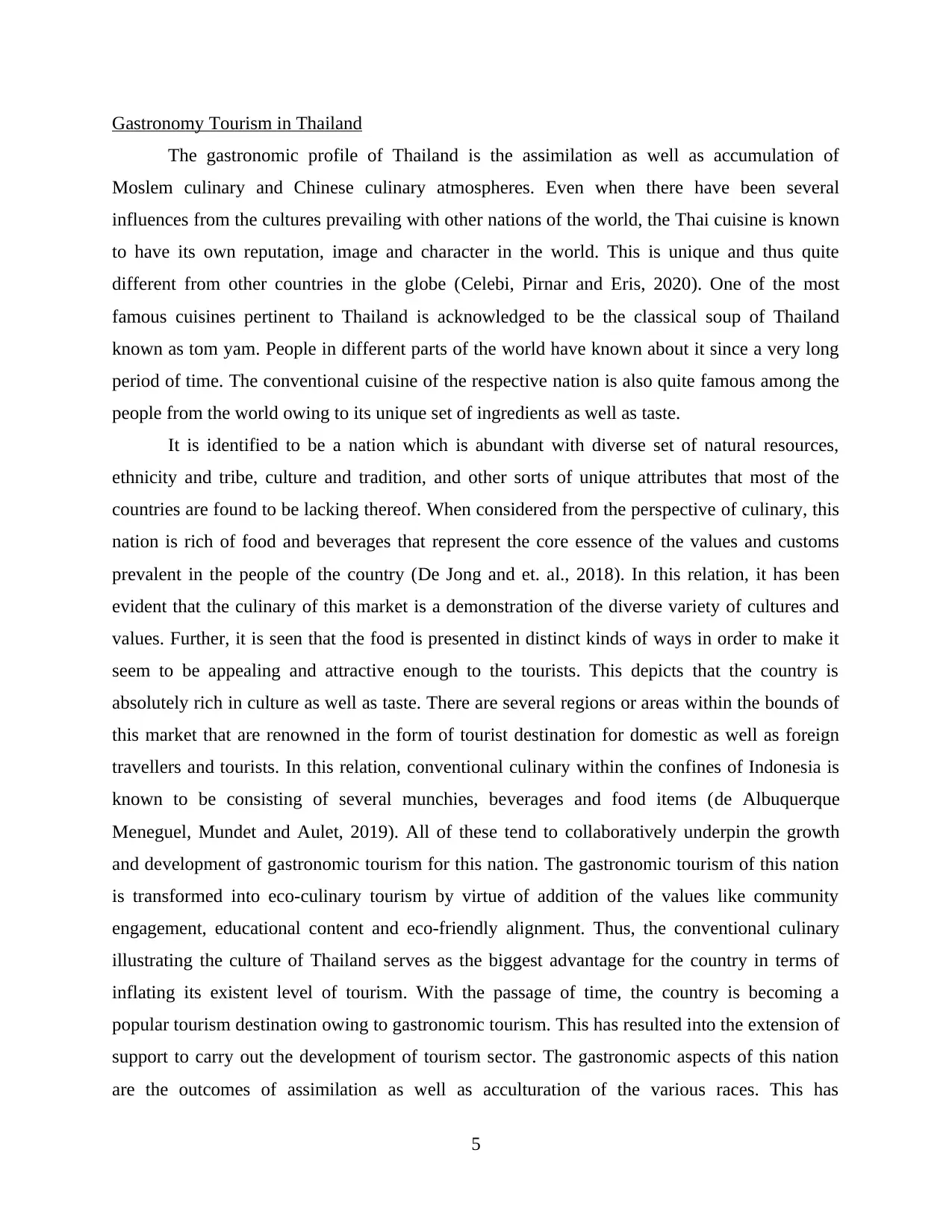
Gastronomy Tourism in Thailand
The gastronomic profile of Thailand is the assimilation as well as accumulation of
Moslem culinary and Chinese culinary atmospheres. Even when there have been several
influences from the cultures prevailing with other nations of the world, the Thai cuisine is known
to have its own reputation, image and character in the world. This is unique and thus quite
different from other countries in the globe (Celebi, Pirnar and Eris, 2020). One of the most
famous cuisines pertinent to Thailand is acknowledged to be the classical soup of Thailand
known as tom yam. People in different parts of the world have known about it since a very long
period of time. The conventional cuisine of the respective nation is also quite famous among the
people from the world owing to its unique set of ingredients as well as taste.
It is identified to be a nation which is abundant with diverse set of natural resources,
ethnicity and tribe, culture and tradition, and other sorts of unique attributes that most of the
countries are found to be lacking thereof. When considered from the perspective of culinary, this
nation is rich of food and beverages that represent the core essence of the values and customs
prevalent in the people of the country (De Jong and et. al., 2018). In this relation, it has been
evident that the culinary of this market is a demonstration of the diverse variety of cultures and
values. Further, it is seen that the food is presented in distinct kinds of ways in order to make it
seem to be appealing and attractive enough to the tourists. This depicts that the country is
absolutely rich in culture as well as taste. There are several regions or areas within the bounds of
this market that are renowned in the form of tourist destination for domestic as well as foreign
travellers and tourists. In this relation, conventional culinary within the confines of Indonesia is
known to be consisting of several munchies, beverages and food items (de Albuquerque
Meneguel, Mundet and Aulet, 2019). All of these tend to collaboratively underpin the growth
and development of gastronomic tourism for this nation. The gastronomic tourism of this nation
is transformed into eco-culinary tourism by virtue of addition of the values like community
engagement, educational content and eco-friendly alignment. Thus, the conventional culinary
illustrating the culture of Thailand serves as the biggest advantage for the country in terms of
inflating its existent level of tourism. With the passage of time, the country is becoming a
popular tourism destination owing to gastronomic tourism. This has resulted into the extension of
support to carry out the development of tourism sector. The gastronomic aspects of this nation
are the outcomes of assimilation as well as acculturation of the various races. This has
5
The gastronomic profile of Thailand is the assimilation as well as accumulation of
Moslem culinary and Chinese culinary atmospheres. Even when there have been several
influences from the cultures prevailing with other nations of the world, the Thai cuisine is known
to have its own reputation, image and character in the world. This is unique and thus quite
different from other countries in the globe (Celebi, Pirnar and Eris, 2020). One of the most
famous cuisines pertinent to Thailand is acknowledged to be the classical soup of Thailand
known as tom yam. People in different parts of the world have known about it since a very long
period of time. The conventional cuisine of the respective nation is also quite famous among the
people from the world owing to its unique set of ingredients as well as taste.
It is identified to be a nation which is abundant with diverse set of natural resources,
ethnicity and tribe, culture and tradition, and other sorts of unique attributes that most of the
countries are found to be lacking thereof. When considered from the perspective of culinary, this
nation is rich of food and beverages that represent the core essence of the values and customs
prevalent in the people of the country (De Jong and et. al., 2018). In this relation, it has been
evident that the culinary of this market is a demonstration of the diverse variety of cultures and
values. Further, it is seen that the food is presented in distinct kinds of ways in order to make it
seem to be appealing and attractive enough to the tourists. This depicts that the country is
absolutely rich in culture as well as taste. There are several regions or areas within the bounds of
this market that are renowned in the form of tourist destination for domestic as well as foreign
travellers and tourists. In this relation, conventional culinary within the confines of Indonesia is
known to be consisting of several munchies, beverages and food items (de Albuquerque
Meneguel, Mundet and Aulet, 2019). All of these tend to collaboratively underpin the growth
and development of gastronomic tourism for this nation. The gastronomic tourism of this nation
is transformed into eco-culinary tourism by virtue of addition of the values like community
engagement, educational content and eco-friendly alignment. Thus, the conventional culinary
illustrating the culture of Thailand serves as the biggest advantage for the country in terms of
inflating its existent level of tourism. With the passage of time, the country is becoming a
popular tourism destination owing to gastronomic tourism. This has resulted into the extension of
support to carry out the development of tourism sector. The gastronomic aspects of this nation
are the outcomes of assimilation as well as acculturation of the various races. This has
5
Paraphrase This Document
Need a fresh take? Get an instant paraphrase of this document with our AI Paraphraser
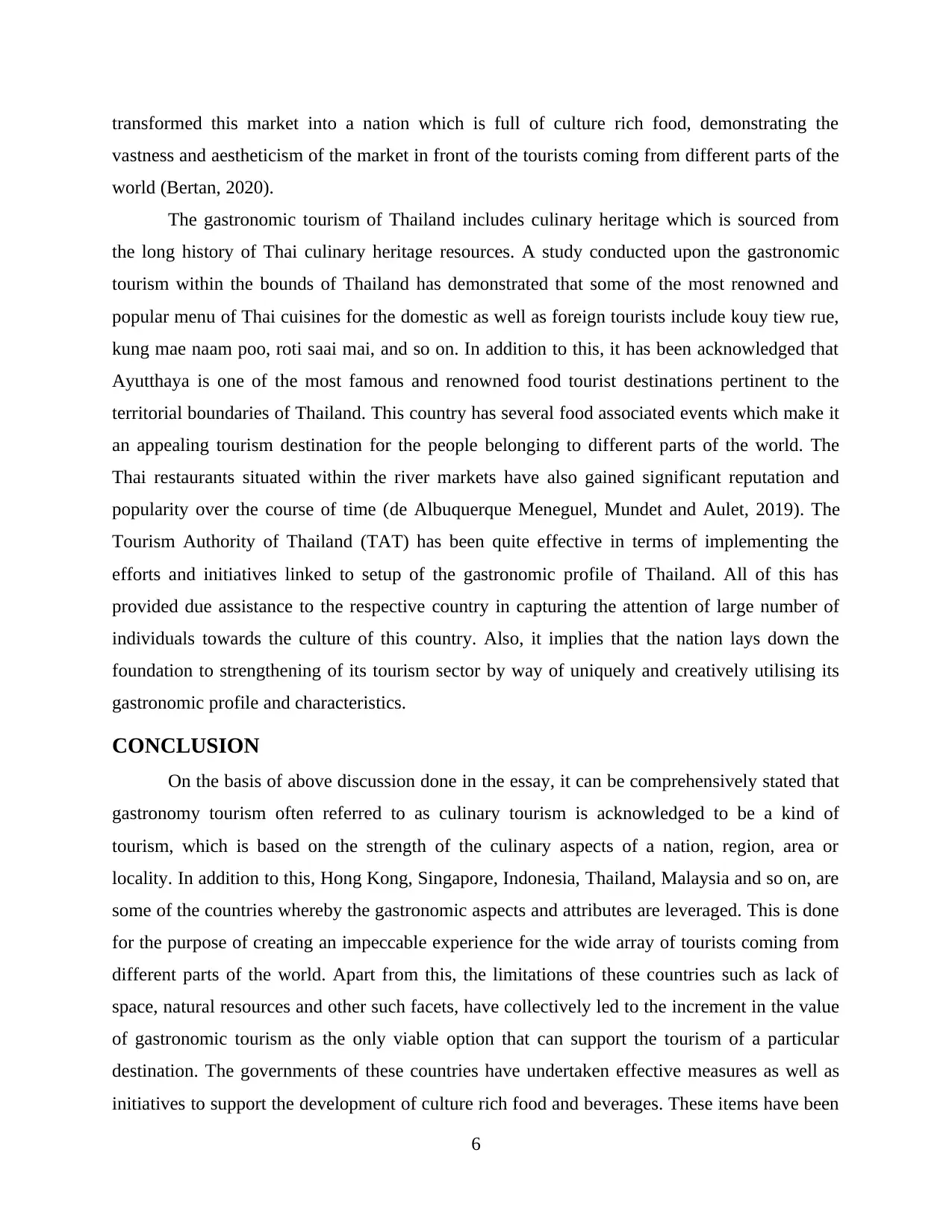
transformed this market into a nation which is full of culture rich food, demonstrating the
vastness and aestheticism of the market in front of the tourists coming from different parts of the
world (Bertan, 2020).
The gastronomic tourism of Thailand includes culinary heritage which is sourced from
the long history of Thai culinary heritage resources. A study conducted upon the gastronomic
tourism within the bounds of Thailand has demonstrated that some of the most renowned and
popular menu of Thai cuisines for the domestic as well as foreign tourists include kouy tiew rue,
kung mae naam poo, roti saai mai, and so on. In addition to this, it has been acknowledged that
Ayutthaya is one of the most famous and renowned food tourist destinations pertinent to the
territorial boundaries of Thailand. This country has several food associated events which make it
an appealing tourism destination for the people belonging to different parts of the world. The
Thai restaurants situated within the river markets have also gained significant reputation and
popularity over the course of time (de Albuquerque Meneguel, Mundet and Aulet, 2019). The
Tourism Authority of Thailand (TAT) has been quite effective in terms of implementing the
efforts and initiatives linked to setup of the gastronomic profile of Thailand. All of this has
provided due assistance to the respective country in capturing the attention of large number of
individuals towards the culture of this country. Also, it implies that the nation lays down the
foundation to strengthening of its tourism sector by way of uniquely and creatively utilising its
gastronomic profile and characteristics.
CONCLUSION
On the basis of above discussion done in the essay, it can be comprehensively stated that
gastronomy tourism often referred to as culinary tourism is acknowledged to be a kind of
tourism, which is based on the strength of the culinary aspects of a nation, region, area or
locality. In addition to this, Hong Kong, Singapore, Indonesia, Thailand, Malaysia and so on, are
some of the countries whereby the gastronomic aspects and attributes are leveraged. This is done
for the purpose of creating an impeccable experience for the wide array of tourists coming from
different parts of the world. Apart from this, the limitations of these countries such as lack of
space, natural resources and other such facets, have collectively led to the increment in the value
of gastronomic tourism as the only viable option that can support the tourism of a particular
destination. The governments of these countries have undertaken effective measures as well as
initiatives to support the development of culture rich food and beverages. These items have been
6
vastness and aestheticism of the market in front of the tourists coming from different parts of the
world (Bertan, 2020).
The gastronomic tourism of Thailand includes culinary heritage which is sourced from
the long history of Thai culinary heritage resources. A study conducted upon the gastronomic
tourism within the bounds of Thailand has demonstrated that some of the most renowned and
popular menu of Thai cuisines for the domestic as well as foreign tourists include kouy tiew rue,
kung mae naam poo, roti saai mai, and so on. In addition to this, it has been acknowledged that
Ayutthaya is one of the most famous and renowned food tourist destinations pertinent to the
territorial boundaries of Thailand. This country has several food associated events which make it
an appealing tourism destination for the people belonging to different parts of the world. The
Thai restaurants situated within the river markets have also gained significant reputation and
popularity over the course of time (de Albuquerque Meneguel, Mundet and Aulet, 2019). The
Tourism Authority of Thailand (TAT) has been quite effective in terms of implementing the
efforts and initiatives linked to setup of the gastronomic profile of Thailand. All of this has
provided due assistance to the respective country in capturing the attention of large number of
individuals towards the culture of this country. Also, it implies that the nation lays down the
foundation to strengthening of its tourism sector by way of uniquely and creatively utilising its
gastronomic profile and characteristics.
CONCLUSION
On the basis of above discussion done in the essay, it can be comprehensively stated that
gastronomy tourism often referred to as culinary tourism is acknowledged to be a kind of
tourism, which is based on the strength of the culinary aspects of a nation, region, area or
locality. In addition to this, Hong Kong, Singapore, Indonesia, Thailand, Malaysia and so on, are
some of the countries whereby the gastronomic aspects and attributes are leveraged. This is done
for the purpose of creating an impeccable experience for the wide array of tourists coming from
different parts of the world. Apart from this, the limitations of these countries such as lack of
space, natural resources and other such facets, have collectively led to the increment in the value
of gastronomic tourism as the only viable option that can support the tourism of a particular
destination. The governments of these countries have undertaken effective measures as well as
initiatives to support the development of culture rich food and beverages. These items have been
6

able to capture the attention of a large number of individuals, thereby strengthening the position
of countries as tourism destinations.
7
of countries as tourism destinations.
7
⊘ This is a preview!⊘
Do you want full access?
Subscribe today to unlock all pages.

Trusted by 1+ million students worldwide
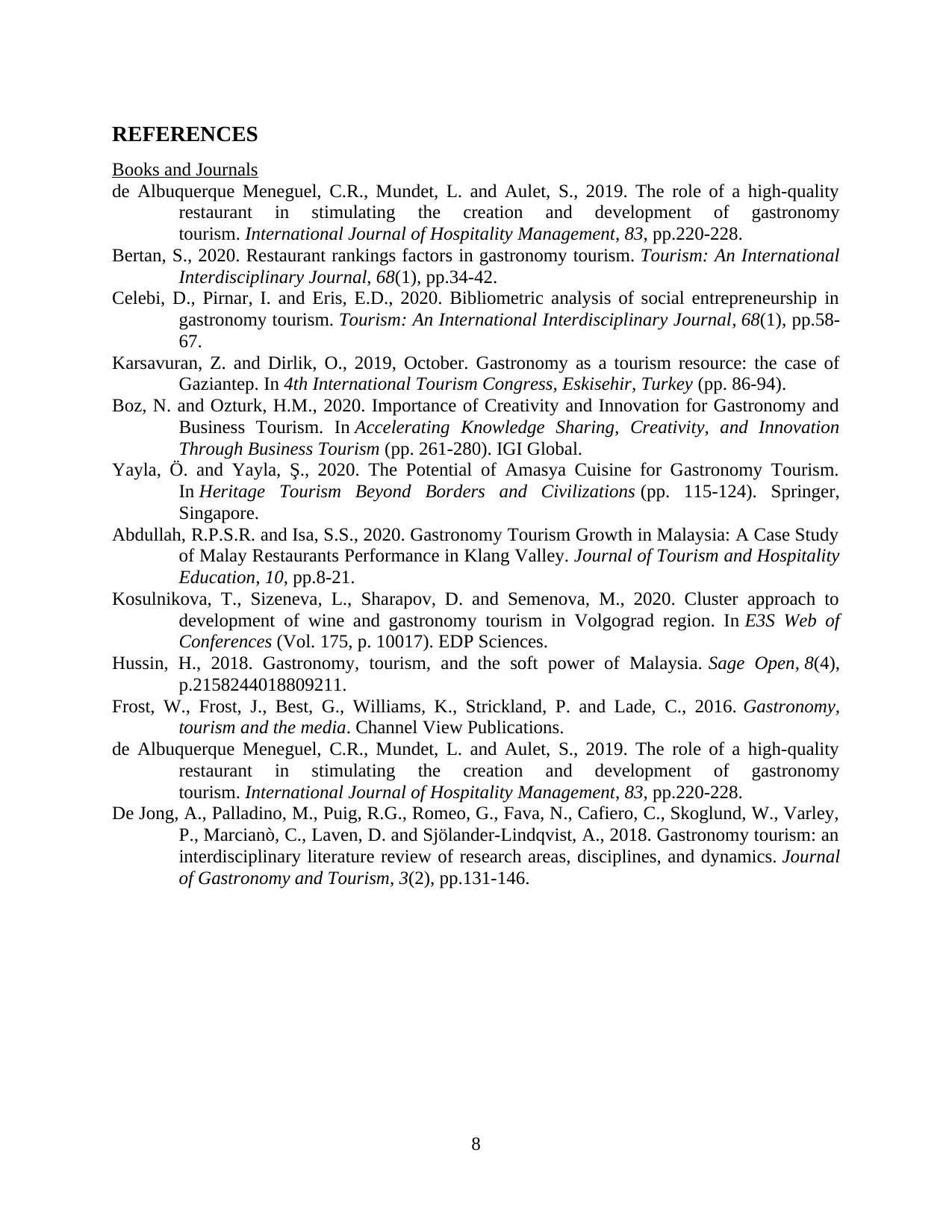
REFERENCES
Books and Journals
de Albuquerque Meneguel, C.R., Mundet, L. and Aulet, S., 2019. The role of a high-quality
restaurant in stimulating the creation and development of gastronomy
tourism. International Journal of Hospitality Management, 83, pp.220-228.
Bertan, S., 2020. Restaurant rankings factors in gastronomy tourism. Tourism: An International
Interdisciplinary Journal, 68(1), pp.34-42.
Celebi, D., Pirnar, I. and Eris, E.D., 2020. Bibliometric analysis of social entrepreneurship in
gastronomy tourism. Tourism: An International Interdisciplinary Journal, 68(1), pp.58-
67.
Karsavuran, Z. and Dirlik, O., 2019, October. Gastronomy as a tourism resource: the case of
Gaziantep. In 4th International Tourism Congress, Eskisehir, Turkey (pp. 86-94).
Boz, N. and Ozturk, H.M., 2020. Importance of Creativity and Innovation for Gastronomy and
Business Tourism. In Accelerating Knowledge Sharing, Creativity, and Innovation
Through Business Tourism (pp. 261-280). IGI Global.
Yayla, Ö. and Yayla, Ş., 2020. The Potential of Amasya Cuisine for Gastronomy Tourism.
In Heritage Tourism Beyond Borders and Civilizations (pp. 115-124). Springer,
Singapore.
Abdullah, R.P.S.R. and Isa, S.S., 2020. Gastronomy Tourism Growth in Malaysia: A Case Study
of Malay Restaurants Performance in Klang Valley. Journal of Tourism and Hospitality
Education, 10, pp.8-21.
Kosulnikova, T., Sizeneva, L., Sharapov, D. and Semenova, M., 2020. Cluster approach to
development of wine and gastronomy tourism in Volgograd region. In E3S Web of
Conferences (Vol. 175, p. 10017). EDP Sciences.
Hussin, H., 2018. Gastronomy, tourism, and the soft power of Malaysia. Sage Open, 8(4),
p.2158244018809211.
Frost, W., Frost, J., Best, G., Williams, K., Strickland, P. and Lade, C., 2016. Gastronomy,
tourism and the media. Channel View Publications.
de Albuquerque Meneguel, C.R., Mundet, L. and Aulet, S., 2019. The role of a high-quality
restaurant in stimulating the creation and development of gastronomy
tourism. International Journal of Hospitality Management, 83, pp.220-228.
De Jong, A., Palladino, M., Puig, R.G., Romeo, G., Fava, N., Cafiero, C., Skoglund, W., Varley,
P., Marcianò, C., Laven, D. and Sjölander-Lindqvist, A., 2018. Gastronomy tourism: an
interdisciplinary literature review of research areas, disciplines, and dynamics. Journal
of Gastronomy and Tourism, 3(2), pp.131-146.
8
Books and Journals
de Albuquerque Meneguel, C.R., Mundet, L. and Aulet, S., 2019. The role of a high-quality
restaurant in stimulating the creation and development of gastronomy
tourism. International Journal of Hospitality Management, 83, pp.220-228.
Bertan, S., 2020. Restaurant rankings factors in gastronomy tourism. Tourism: An International
Interdisciplinary Journal, 68(1), pp.34-42.
Celebi, D., Pirnar, I. and Eris, E.D., 2020. Bibliometric analysis of social entrepreneurship in
gastronomy tourism. Tourism: An International Interdisciplinary Journal, 68(1), pp.58-
67.
Karsavuran, Z. and Dirlik, O., 2019, October. Gastronomy as a tourism resource: the case of
Gaziantep. In 4th International Tourism Congress, Eskisehir, Turkey (pp. 86-94).
Boz, N. and Ozturk, H.M., 2020. Importance of Creativity and Innovation for Gastronomy and
Business Tourism. In Accelerating Knowledge Sharing, Creativity, and Innovation
Through Business Tourism (pp. 261-280). IGI Global.
Yayla, Ö. and Yayla, Ş., 2020. The Potential of Amasya Cuisine for Gastronomy Tourism.
In Heritage Tourism Beyond Borders and Civilizations (pp. 115-124). Springer,
Singapore.
Abdullah, R.P.S.R. and Isa, S.S., 2020. Gastronomy Tourism Growth in Malaysia: A Case Study
of Malay Restaurants Performance in Klang Valley. Journal of Tourism and Hospitality
Education, 10, pp.8-21.
Kosulnikova, T., Sizeneva, L., Sharapov, D. and Semenova, M., 2020. Cluster approach to
development of wine and gastronomy tourism in Volgograd region. In E3S Web of
Conferences (Vol. 175, p. 10017). EDP Sciences.
Hussin, H., 2018. Gastronomy, tourism, and the soft power of Malaysia. Sage Open, 8(4),
p.2158244018809211.
Frost, W., Frost, J., Best, G., Williams, K., Strickland, P. and Lade, C., 2016. Gastronomy,
tourism and the media. Channel View Publications.
de Albuquerque Meneguel, C.R., Mundet, L. and Aulet, S., 2019. The role of a high-quality
restaurant in stimulating the creation and development of gastronomy
tourism. International Journal of Hospitality Management, 83, pp.220-228.
De Jong, A., Palladino, M., Puig, R.G., Romeo, G., Fava, N., Cafiero, C., Skoglund, W., Varley,
P., Marcianò, C., Laven, D. and Sjölander-Lindqvist, A., 2018. Gastronomy tourism: an
interdisciplinary literature review of research areas, disciplines, and dynamics. Journal
of Gastronomy and Tourism, 3(2), pp.131-146.
8
1 out of 10
Your All-in-One AI-Powered Toolkit for Academic Success.
+13062052269
info@desklib.com
Available 24*7 on WhatsApp / Email
![[object Object]](/_next/static/media/star-bottom.7253800d.svg)
Unlock your academic potential
Copyright © 2020–2026 A2Z Services. All Rights Reserved. Developed and managed by ZUCOL.

